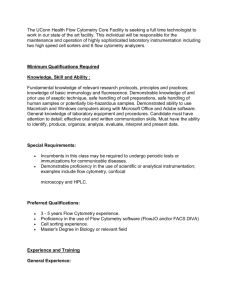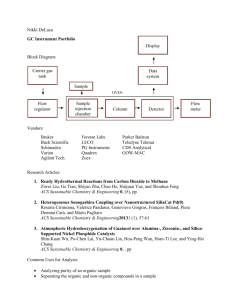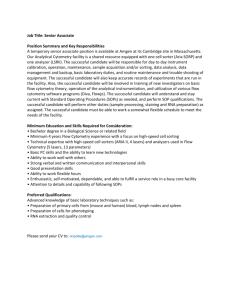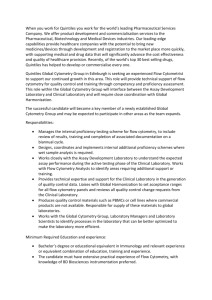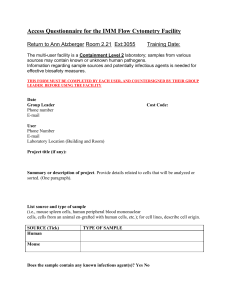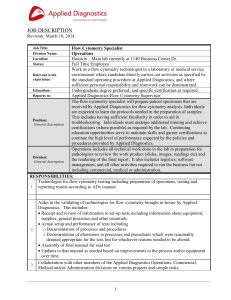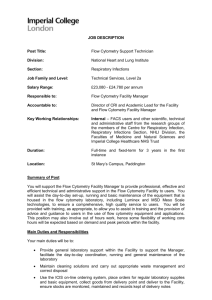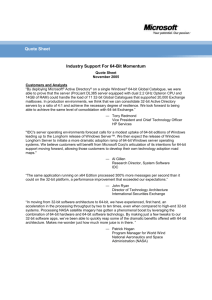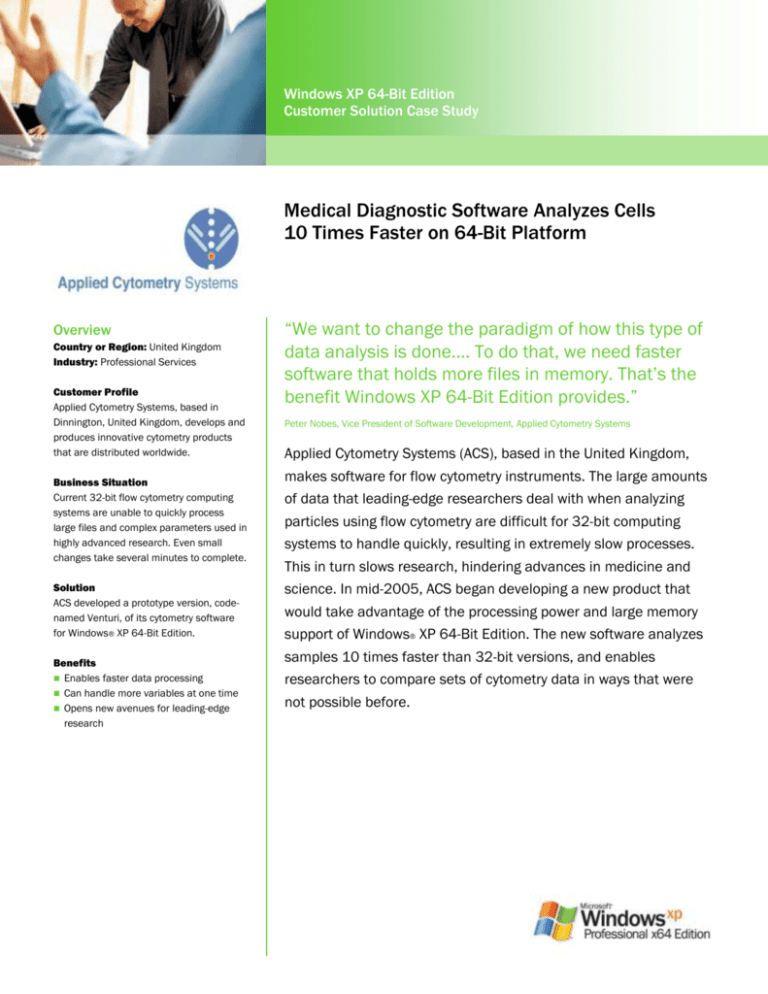
Windows XP 64-Bit Edition
Customer Solution Case Study
Medical Diagnostic Software Analyzes Cells
10 Times Faster on 64-Bit Platform
Overview
Country or Region: United Kingdom
Industry: Professional Services
Customer Profile
Applied Cytometry Systems, based in
Dinnington, United Kingdom, develops and
produces innovative cytometry products
that are distributed worldwide.
Business Situation
Current 32-bit flow cytometry computing
systems are unable to quickly process
large files and complex parameters used in
highly advanced research. Even small
changes take several minutes to complete.
Solution
ACS developed a prototype version, codenamed Venturi, of its cytometry software
for Windows® XP 64-Bit Edition.
Benefits
Enables faster data processing
Can handle more variables at one time
Opens new avenues for leading-edge
research
“We want to change the paradigm of how this type of
data analysis is done…. To do that, we need faster
software that holds more files in memory. That’s the
benefit Windows XP 64-Bit Edition provides.”
Peter Nobes, Vice President of Software Development, Applied Cytometry Systems
Applied Cytometry Systems (ACS), based in the United Kingdom,
makes software for flow cytometry instruments. The large amounts
of data that leading-edge researchers deal with when analyzing
particles using flow cytometry are difficult for 32-bit computing
systems to handle quickly, resulting in extremely slow processes.
This in turn slows research, hindering advances in medicine and
science. In mid-2005, ACS began developing a new product that
would take advantage of the processing power and large memory
support of Windows® XP 64-Bit Edition. The new software analyzes
samples 10 times faster than 32-bit versions, and enables
researchers to compare sets of cytometry data in ways that were
not possible before.
Situation
Applied Cytometry Systems (ACS), formed in
1993, is based in Dinnington, United
Kingdom. ACS has experience in all aspects
of flow cytometry including sales, service,
training, electronics, optics, mechanical
design, software, and customer support. The
company employs 30 people, 10 of whom are
software developers.
“The new x64 compiler
in Visual Studio 2005 is
very nice. Code
generation is faster, and
the OpenMP support
makes configuring the
application to scale
across multiple
processors ridiculously
simple.”
David Roberts, Lead Architect, Applied
Cytometry Systems
Flow cytometry instruments measure the
characteristics of microscopic particles, such
as human cells, that are suspended in fluid.
Researchers label the particles with
fluorescent markers that cause certain
components of the particle to either scatter
light or fluoresce as the fluid passes through
a beam of light. A detector measures the
results and sends the data to an attached
computer, which saves the data as a file. ACS
software enables users to read, analyze, and
manipulate the data on the file through “dot
plot” displays in which the various
characteristics of the particle are indicated by
differently colored dots. Flow cytometry’s
applications include HIV monitoring, leukemia
testing, and cancer research.
A large or complex project might require a
researcher to look at tens of markers on
hundreds of patients with tens of thousands
or even millions of cells on each sample. As a
result, the files that the instrument creates
are very large. These files are growing to
hundreds of megabytes in size as
researchers work with more data. The
computers attached to flow cytometers have
until now had 32-bit processors, which lack
the power to process this amount of data
quickly. Making small adjustments to a plot
might take several minutes to complete.
Dr. Vera Donnenberg, Director of Basic
Research for the Heart, Lung and Esophageal
Surgery Institute at the University of
Pittsburgh, says, “With our current system,
just opening a file takes so long that I can get
up, go get a cup of coffee—which is not close
by!—come back, and the computer screen is
still being refreshed.”
“Although the software as it exists now can
technically do everything that we want it to
do, it is so difficult to use because of the
speed issue,” adds Dr. Albert Donnenberg,
Director of the Flow Cytometry Facility at the
University of Pittsburgh Cancer Institute. “If
we didn’t have the bottleneck of speed, we
could perhaps be analyzing these files in
minutes. Instead, it literally takes us hours.”
Solution
To meet the growing needs of its customers,
ACS developed a prototype version of its
software for the Windows® XP 64-Bit Edition
operating system. David Roberts, Lead
Architect at ACS, began work on the product—
code-named “Venturi”—in mid-2005 using the
Microsoft® Visual Studio® 2005 and
Microsoft Visual C++® 2005 development
systems, with the Open Multi Processor
(OpenMP) application programming interface.
“The new x64 compiler in Visual Studio 2005
is very nice,” says Roberts. “Code generation
is faster, and the OpenMP support makes
configuring the application to scale across
multiple processors ridiculously simple.”
ACS borrowed the idea of creating a “playlist”
for users from Windows Media® player. A flow
cytometry computer might have hundreds of
thousands of raw data files stored on it.
Keywords describing the contents of a file
can be entered into the file’s header. A
Venturi user can search for files stored on the
computer using those keywords, and group
them into lists for analysis and comparison in
the program’s main screen.
ACS plans to develop the prototype software
further, working with its customers to get
their feedback on how well it meets their
needs. The company intends to release a
commercial version of the product in the first
or second quarter of 2007.
Benefits
ACS is building its new software product to
take maximum advantage of the benefits that
Windows XP 64-Bit Edition offers: high
performance, large memory, and
multiprocessor support. When it’s released,
this software will provide researchers with a
powerful tool that will enable them to analyze
data faster than ever before, using more
variables at a time. ACS believes these
changes will open up new avenues in
research never before available.
“ACS ran a demo of its
64-bit software for us,
using a file that we
provided, and it ran
more than 10 times
faster. It was amazing.”
Dr. Albert Donnenberg, Director of the Flow
Cytometry Facility, University of Pittsburgh
Cancer Institute
Enables Faster Data Processing
Customers who’ve seen Venturi in action can
attest to the difference it makes in the time it
takes to analyze large amounts of data. Dr.
Albert Donnenberg says, “We’ve been
working heavily in the area of cancer stem
cells, dealing with about 6 million to 10
million cells with about 11 different
parameters. We worked on the data every
morning for 10 days using our fastest
workstation, and only analyzed 30 files. ACS
ran a demo of its 64-bit software for us, using
a file that we provided, and it ran more than
10 times faster. It was amazing.”
Able to Handle More Variables at One
Time
Before the development of Venturi, flow
cytometry software opened a separate
window for each plot. Users would have to
manipulate all of those windows in order to
update their view of the data. The increased
processing power of Windows XP 64-Bit
Edition makes the software capable of
presenting all of the plots, no matter how
complex, in a single document.
Opens New Avenues for Leading-Edge
Research
ACS predicts that the advent of 64-bit
computing in flow cytometry will change
research significantly. Peter Nobes, Vice
President of Software Development at ACS,
says, “We want to change the paradigm of
how this type of data analysis is done: from
looking at the results for one patient on a
single day, to seeing how one patient fits in
with all of the patients of that type; or how
these results fit in with a whole study. To do
that, we need faster software that holds more
files in memory. That’s the benefit Windows
XP 64-Bit Edition provides.”
For More Information
Windows XP 64-Bit Edition
For more information about Microsoft
products and services, call the Microsoft
Sales Information Center at (800) 4269400. In Canada, call the Microsoft
Canada Information Centre at (877) 5682495. Customers who are deaf or hard-ofhearing can reach Microsoft text telephone
(TTY/TDD) services at (800) 892-5234 in
the United States or (905) 568-9641 in
Canada. Outside the 50 United States and
Canada, please contact your local
Microsoft subsidiary. To access information
using the World Wide Web, go to:
www.microsoft.com
Microsoft Windows XP 64-Bit Edition gives
you the freedom to do what you want at home
and at work--simply, reliably, and securely.
For more information about Windows XP 64Bit Edition, go to:
www.microsoft.com/windowsxp/64bit
For more information about Applied
Cytometry Systems products and services,
call +44 (0)1909 566982 or visit the Web
site at:
www.appliedcytometry.com
Software and Services
Microsoft Windows XP 64-Bit Edition
Microsoft Visual Studio 2005
© 2006 Microsoft Corporation. All rights reserved. This case
study is for informational purposes only. MICROSOFT MAKES NO
WARRANTIES, EXPRESS OR IMPLIED, IN THIS SUMMARY.
Microsoft, Visual C++, Visual Studio, Windows, the Windows
logo, and Windows Media are either registered trademarks or
trademarks of Microsoft Corporation in the United States and/or
other countries. All other products are property of their
respective owners.
Document published March 2006
Microsoft Visual C++ 2005

